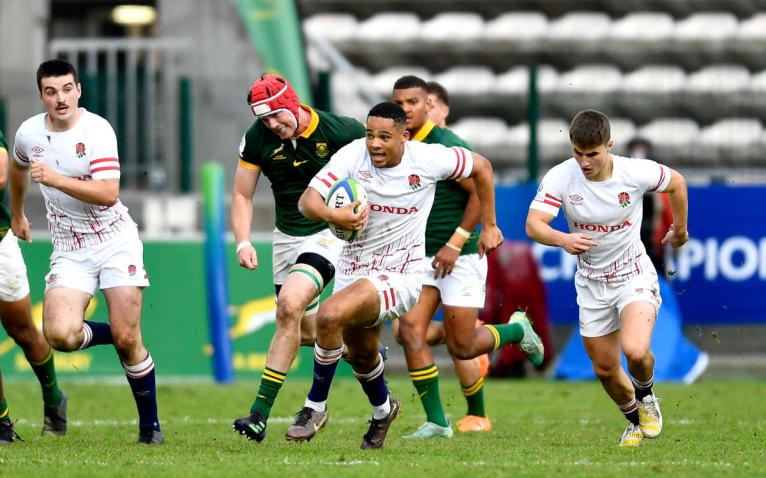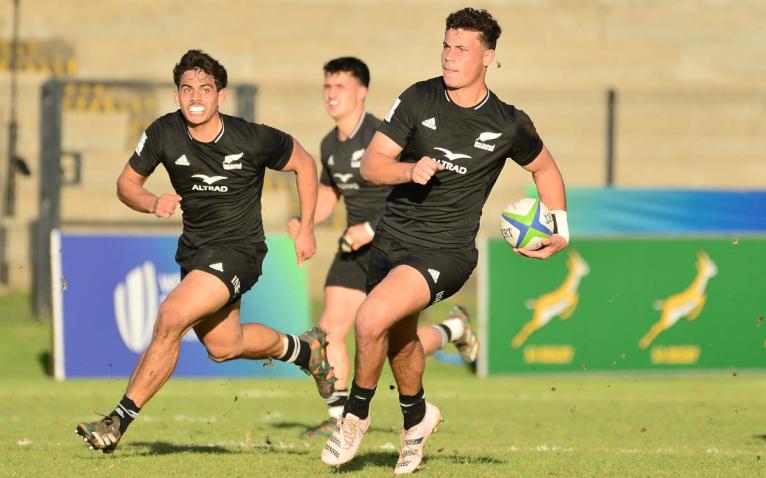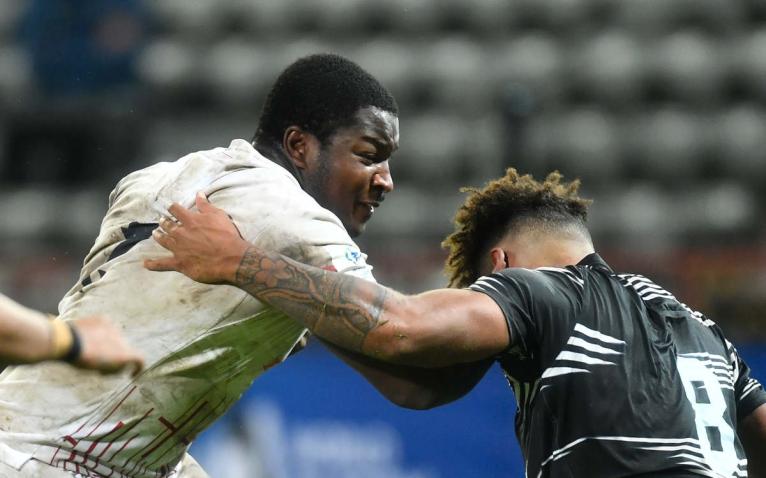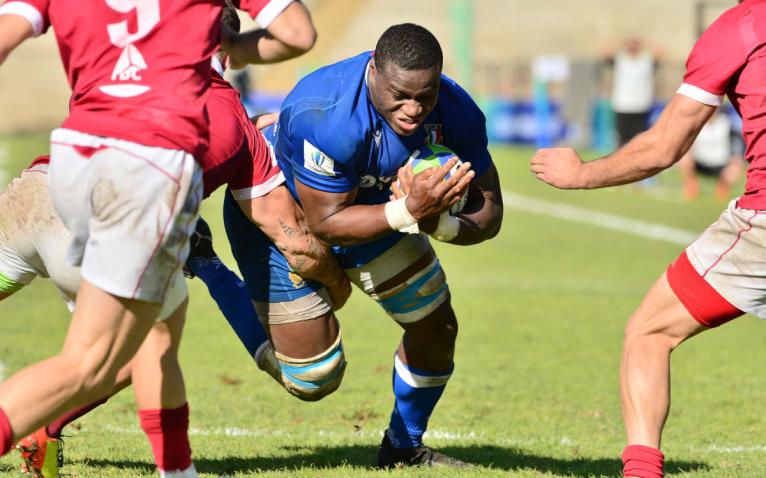They say absence makes the heart grow fonder and few things better support that statement than the return of the World Rugby U20 Championship this year.
After a three-year absence due to Covid, the tournament returned in spectacular fashion in Cape Town, as the world’s elite age-grade rugby players lit up three venues across the city and showcased their skill sets in front of the watching world.
France were unsurprisingly dominant, lifting their third-straight title with an emphatic win over Ireland in the final, as traditional powerhouses England, South Africa and New Zealand failed to fully click into gear and challenge the monopoly that the French now have on age-grade rugby.
Elsewhere, Fiji and Georgia impressed, with both sides managing to avoid the relegation playoff, whilst a under-performing Italian side earned a final reprieve, beating Japan in their final match and condemning the Baby Blossoms to the U20 Trophy in 2024.
Wins and titles aside, the tournament is also a fantastic window into the future of club and international rugby, with numerous players putting their hands up for opportunities at the next level. With that in mind, we have selected a standout XV of players from the last three weeks of rugby, each and every one of whom is worth keeping a close eye on in the years to come.
- Yoshitaka Yazaki, Japan
An honourable mention to Ireland’s Henry McErlean and France’s Mathis Ferté, but Yazaki’s performances in a Japanese side that was significantly outgunned in most fixtures, were a beacon of real hope for the Blossoms’ bid to establish themselves as a competitive Tier 1 side over the next decade.
Japan’s national team very rarely call up younger players too soon after their time with the 20s, but once Yazaki lands with a Top League team, it likely won’t be long before he’s making an impact in Test rugby. With strong fundamentals and an ability to almost always beat the first defender, Yazaki can add some x factor to the Japanese back line over the next couple of Rugby World Cup cycles.
- Cassius Cleaves, England
If there was one player at the Championship for opposition sides to deny space and opportunity to, it was Cleaves. His incisive footwork, rapid acceleration and eye for a gap marked him out as one of the most devastating ball-carriers in the competition. In an England side that sometimes misfired, Cleaves was a threat from anywhere on the pitch.
His rival 14 in the final round, Jurenzo Julius, also impressed over the past few weeks, but it was the work off of his wing that Cleaves prospered with that just set him ahead of the South African flier.

- Nicolas Depoortere, France
The Frenchman was a class apart at the position over the last three weeks. His physical presence was tough for defences to deal with, whilst his mobility and understanding of the game made him a tough lock for opposition attacks to pick.
The Bordeaux youngster has the skill set to succeed at 12 or 13 and should add significantly next season to his 12 appearances so far for his club. He has the makings of being a key cog in an already highly-impressive French senior side for the 2027 and 2031 Rugby World Cup cycles.
- Ethan Hooker, South Africa
Paul Costes could easily have formed an all-French midfield here and there was no denying the efficiency of Australia’s David Vaihu when it came to ball-carrying, but both fell just short of the complete performances turned in by Hooker. A powerful and direct centre, but with a subtle handling game that shouldn’t be overlooked, Hooker is very much built in the mould of a typical Springbok inside centre.
His future is committed to the Sharks and he will be hoping to push the likes of Rohan Janse van Rensburg next season and partner Lukhanyo Am in new coach John Plumtree’s starting centre pairing.
- Macca Springer, New Zealand
In a disappointing tournament for the Baby Blacks, Springer was a shining light. Although the New Zealand side didn’t lack for individual talent, they come unstuck against more cohesive teams like France and Australia, not to mention being run extremely close by Wales. That said, Springer’s performances were consistently excellent and backed up the flashes he showed in his rookie Super Rugby season.
The Crusaders wing was devastating as a counter-attacker and on the occasions when New Zealand were able to put him into space, he did not waste his opportunities. As he develops his kicking game and defensive decision-making, expect to see him make the step up to the senior side.

- Isaiah Ravula, Fiji
Few would dispute either of the fly-halves from the final, Sam Prendergast or Hugo Reus, being in this spot, but Ravula was the spearhead of an incredibly successful tournament for the Fijian side. Not only did Fiji avoid relegation, they also avoided the final relegation playoff all together, as Ravula provided points, tactical control and playmaking in a highly-accomplished showing.
Fiji can struggle to produce fly-halves who provide the game management side of the position to the same level as their playmaking, particularly for Test level rugby, but Ravula looks set to buck that trend, with his performances against Australia and Italy specifically impressive in that regard.
- Baptiste Jauneau, France
This is tough not only on Jauneau’s teammate Leo Carbonneau, but also Teddy Wilson, who had a fine tournament for Australia and in most other years, would have been an easy selection here. That both players were left in Jauneau’s wake says a lot about how controlled and influential the young man from Clermont has been, however.
He tested defences frequently with his sniping breaks, his support play was excellent and he had the best pass and ability to read the game of any nine at the tournament. Throw into the mix some more than noteworthy defending for a man his size and France seem to have yet again hit the jackpot with a talented scrum-half whose ceiling is enviably high.
- Giorgi Mamaiashvili, Georgia
Just as it was at scrum-half, two Frenchmen were in the mix here, with Louis Penverne and Lino Julien both impressing, however it was Mamaiashvili who looked like the most destructive scrummaging loosehead at the competition. The Grenoble player was crucial in the group stage, taking apart multiple tightheads, as Georgia booked themselves a place in the middle tier playoffs.
The Lelos do not lack for formidable options in this position, though it’s that constant stream of talent that impresses not only the world, but more pertinently, French club owners. It would not be surprising to see Mamaiashvili starting regularly in the Top 14 in coming seasons.
- Nathan Jibulu, England
Honourable mentions for Georgia’s Basa Khonelidze and Ireland’s Gus McCarthy, but no other hooker had the same bolstering presence and ability to improve their team as Jibulu did when he was on the pitch for England. With the Harlequin at hooker, England’s lineout looked safe, efficient and was an effective platform from which to launch either their maul or their talented back line.
Jibulu’s carrying also stood out at the tournament, as he provided impetus away from the set-piece as well at it. The physical demands of senior club rugby are a step up from age-grade, but Billy Millard will be licking his lips at the prospect of the youngster breaking through into his senior 23 over the next 12 months.

- Zaccharie Affane, France
Japan’s Riku Tomita and Italy’s Marcos Gallorini were hot on Affane’s heels, but after his dominant solo tackle on Chandler Cunningham-South in the semi-final, it was hard to go with anyone but the Frenchman for this spot. It was a good tournament for tightheads, with Afolabi Fasogbon also putting in performances of note.
Affane, though, not only brought unrelenting physicality in the loose, he led an unstoppable French scrum all the way to the final and their third-straight title at this level. Bordeaux have themselves an already rather smooth diamond, who should only go from strength to strength over the coming years.
- Tahlor Cahill, New Zealand
Locks are like gold dust in the professional game at the moment, with almost every club or nation looking to improve their depth or starting options. With the U20 Championship this year littered with hybrid lock/blindsides, the performances of Cahill, who shapes up to be a genuine second row option at the next level, will have pleased Scott Robertson and the All Blacks coaching staff.
He carried well and was among the more dominant defensive solo tacklers at the tournament, whilst also offering a reliable linout option for a Kiwi pack that struggled to deliver on its promise. A mention, too, for Georgia’s Guram Ganiashvili, who could bring some welcome athleticism to the Lelos’ engine room in the coming years.
- JF van Heerden, South Africa
Unfortunately, an injury to the South African denied us the contest between him and the other standout five lock at the Championship, England’s Lewis Chessum, in the 3rd/4th place playoff. That said, his performances up until that point just stole him the march on his northern hemisphere rival.
A strong carrier, physical defender and highly-promising lineout forward, van Heerden was one of the few players to really get the home crowd excited in Cape Town, as the Baby Boks lacked a little of the trademark power and efficiency that permeates all levels of South African rugby. Keep your eye on van Heerden over the next couple of years, whether that’s as a five lock or a Pieter-Steph du Toit-esque blindside at the next level.
- Brian Gleeson, Ireland
It says a lot about the man that we’ve opted for at Number 8 that we have moved a player as impressive as Gleeson over to blindside in order to accommodate them in this XV. No player was more inspirational leading from the front for Ireland than the back rower, who continues an eye-watering production line of loose forwards coming out of Munster in the last four or five years.
If you’re picking a three-man shortlist for player of the tournament, Gleeson is a certainty to be among that trio, and though France were good value for their title, the Irishman was one of a handful who did not deserve to be on the losing side. Alongside the likes of Gavin Coombes, Alex Kendellen and John Hodnett, Graham Rowntree is not going to lack for back row options moving forward.
- David Odiase, Italy
A word for South Africa’s Paul de Villiers, who played with energy and physicality throughout the tournament, but it came down to a two-horse race between Odiase and his Fijian counterpart, Motikai Murray. Both displayed their skill sets well and led effectively as captains, with Italy avoiding relegation and Fiji pushing up on into the 9th place playoff.
It was the dominance of the defensive collisions from the Italian, particularly in the win over South Africa and the relegation playoff victory over Japan, that just edged him ahead and into this spot. His emotional speeches have had him going viral on social media, but Odiase’s rugby has more than backed that up over the course of the Championship.

- Marko Gazzotti, France
It’s hard not to get caught up in the power of Gazzotti’s carrying and defensive collisions, but it’s the work rate that he brings alongside that which truly makes him such an exciting prospect. In no moment was this more encapsulated than in the final, when his chase and tackle on Irish full-back McErlean lead to Depoortere’s try, which gave France a three-score lead and took the game beyond Ireland.
The fact that Gazzotti has been developed at a Pro D2 team like Grenoble, and that he is eligible and considered for selection, is further proof of how right French rugby have got their set-up and why they are reaping such rich rewards at all levels currently.



As other commenters have said, it’s a strange selection given the dominance of Ireland and France in particular. It seems like you are trying to deliberately shoehorn in players, albeit good players, to cover all most of the teams involved.
No Tuilagi, seriously??
Don't know what tournament you were watching, only 5 players from the final selected and one of those picked for a different position 🤔. Ridiculous to say the least
Ridiculous logic looks like click baity agitation rather than intelligent appreciation of the game and players
What a load of rubbish. Only 5 out of the final 2 teams and only 1Iris. Don’t know what you were watching
what a strange selection....4 French and 1 Irish from the two outstanding teams in the competition. Others will have their views but to move Gleeson as the solitary Irishman...really?. France could have had 8 or 10. They were brilliant all over the park.